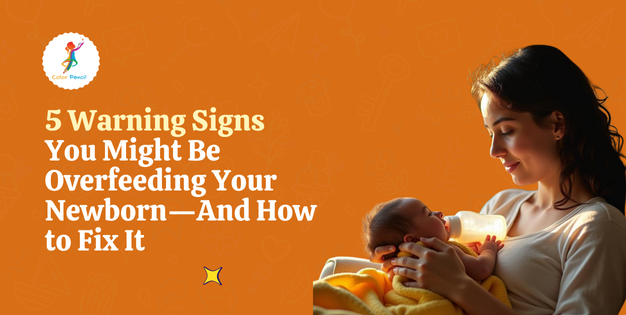
Is Your Child Struggling with Math Phobia? 7 Simple Ways to Make Math Less Scary
If math homework feels like a daily battle and numbers bring more tears than triumphs, your child might be dealing with math phobia. It’s more

Feeding a newborn seems simple—if they’re crying, they must be hungry, right? Not always. Many parents worry about whether their baby is eating enough, but overfeeding a newborn can also be a concern. While a baby’s appetite varies, too much milk (breast or formula) can lead to discomfort, gas, and excessive spit-up.
So how do you know if your baby is getting more than they need? Here are the telltale signs of overfeeding a newborn and what you can do to ensure a balanced feeding routine.
When you bring your baby home, it’s important to focus on their feeding routine, so they feel comfortable and secure. Learn what to expect on your baby’s first day home and set the foundation for healthy feeding habits from the start.

Babies spit up—it’s normal. But if your little one is spitting up excessively after almost every feeding, it may be a sign they’re taking in too much milk at once. Overfeeding can cause the stomach to become too full, leading to more baby spit up vs vomit situations.
💡 Fix It: Try smaller, more frequent feedings and keep your baby upright for at least 20–30 minutes after eating to help with digestion.
A full, satisfied baby is typically calm after a feed. But if your baby seems irritable or gassy after eating, it could mean they’ve been fed too much. An overly full belly can lead to discomfort, bloating, and even mild reflux.
💡 Fix It: Look for early hunger cues rather than assuming every cry means hunger. This can help prevent offering milk when your baby might actually need a cuddle or a diaper change instead.

Frequent hiccups, gas, or burping can be another indicator of overfeeding. When babies drink too fast or take in too much milk, they also swallow excess air, leading to gas and discomfort.
💡 Fix It: Use paced bottle feeding if bottle-feeding, which mimics breastfeeding by allowing the baby to control the flow. If breastfeeding, ensure a good latch to reduce air intake.
Steady weight gain is a good sign of a thriving baby, but gaining weight too quickly can sometimes indicate overfeeding. Pediatricians track weight gain patterns, and if a baby is gaining significantly faster than expected, it might be time to reassess feeding habits.
💡 Fix It: If you’re concerned about rapid weight gain, consult your pediatrician for guidance on adjusting feeding amounts while still meeting nutritional needs.
A well-fed baby should sleep soundly after a meal. If your baby is struggling to settle down and seems restless after a feed, an overly full tummy might be to blame. Overfeeding can make it harder for babies to get comfortable and stay asleep.
💡 Fix It: Ensure your baby is showing true hunger signs before offering milk, and avoid feeding right before naps unless it’s part of their natural routine.

Babies give cues when they’ve had enough, but they’re not always easy to spot. Here’s how to know if newborn is full and doesn’t need more milk:
Watch for Hunger Cues Instead of Sticking to a Strict Schedule: Every baby has different needs—crying isn’t always a sign of hunger. Look for early cues like sucking on hands, rooting, or smacking lips before feeding.
Practice Paced Bottle Feeding: If bottle-feeding, use a small wonder breast pump or another slow-flow nipple to mimic breastfeeding, allowing the baby to take breaks and feed at a natural pace.
Allow for Digestion Time: If your baby seems unsettled, try soothing them in other ways—rocking, skin-to-skin contact, or offering a pacifier—before assuming they need more milk.
Breastfeeding and Overfeeding: Is It Possible?: Breastfed babies typically self-regulate, but in cases where a baby is comfort nursing for long periods, they may still consume more milk than needed. Offering a pacifier or another soothing technique can help if your baby wants to suckle but isn’t hungry.
Feeling Overwhelmed? Let’s Talk! Join Our Parent Forum and Get Expert Advice & Support!
While less common than bottle-feeding, overfeeding can still happen if a baby nurses excessively for comfort rather than hunger. Watching for fullness cues can help regulate feeding.
Use paced feeding techniques, ensure a slow-flow nipple, and avoid forcing the baby to finish the bottle if they show signs of being full.
Keep them upright for 20–30 minutes, burp them gently, and feed smaller amounts more frequently if needed. If excessive vomiting occurs, consult your pediatrician.
Follow hunger cues rather than a rigid schedule, and allow your baby to determine how much they eat rather than encouraging them to finish a bottle.
Feeding your baby is one of the most instinctive yet challenging parts of parenting. By recognizing the signs of overfeeding a newborn and adjusting feeding habits, you can ensure your baby stays happy, healthy, and well-nourished. Trust your instincts, watch for cues, and don’t hesitate to reach out to your pediatrician for guidance if you have concerns about your baby’s feeding patterns.Just as you focus on safe feeding practices, ensuring the products you use on your baby’s skin are safe is equally important. Find out which skincare products are safe for your baby to keep them comfortable and healthy.